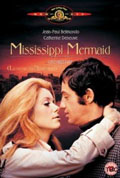
France 1969
Directed by
Francois Truffaut
123 minutes
Rated M
Reviewed by
Bernard Hemingway

Mississippi Mermaid
The French New Wave directors were big fans of American film noir but more as a pre-text for their own artistic games than to recreate them stylistically. This shows clearly in this middle period Truffaut film based on a story by pulp fiction writer, Cornell Woolrich (whose real name was William Irish) called Waltz Into Darkness (the English title of Truffaut's film is misleadiing, "sirène" here means "temptress").
Truffaut transposes the original setting from America to Africa and Europe and has Jean-Paul Belmondo as Louis Mahé, a 38-year-old wealthy tobacco plantation owner on the island of Réunion who marries a beautiful woman, Julie Roussel (Catherine Deneuve), who he met through a newspaper personals column. Things look odd from the get-go but the smitten Louis does not want to know. Julie shortly thereafter cleans out his bank account and disappears. He tracks her down working as a dance hostess in a nightclub in Antibes but when he confronts her, he realizes that he’d rather be with her on the outside of the law than live his former life of lonlely well-to-do respectability.
The film has some intrusive plot holes in it and Belmondo’s Louis seems on the one hand remarkably comfortable with his wife’s role as an accomplice in murder, on the other strangely uninterested in retrieving the money she and her accomplice (whom we never really see) stole, these shortcoming being exaggerated by the incongruity of Truffaut's trademark.naturalistic style with the punchy pacing of the B movie with its hard-boiled dialogue. This is so much so that one can't help but run an alternative version in one's imagination, say with John Garfield and Lana Turner in the leads.
Although she doesn't play up to the role Deneuve is perfectly believable as a femme fatale (even when the pair are holed up in a shack in the snow-covered woods Deneuve never looks less than glamorous) and as a result Louis’ fall, and her self-entrapment in it is completely comprehensible. The film's ending however which culminates a near-operatic crescendo of doomed love deserved to be more definitive instead of the inconclusive freeze frame Truffaut gives us. .
Want something different?





